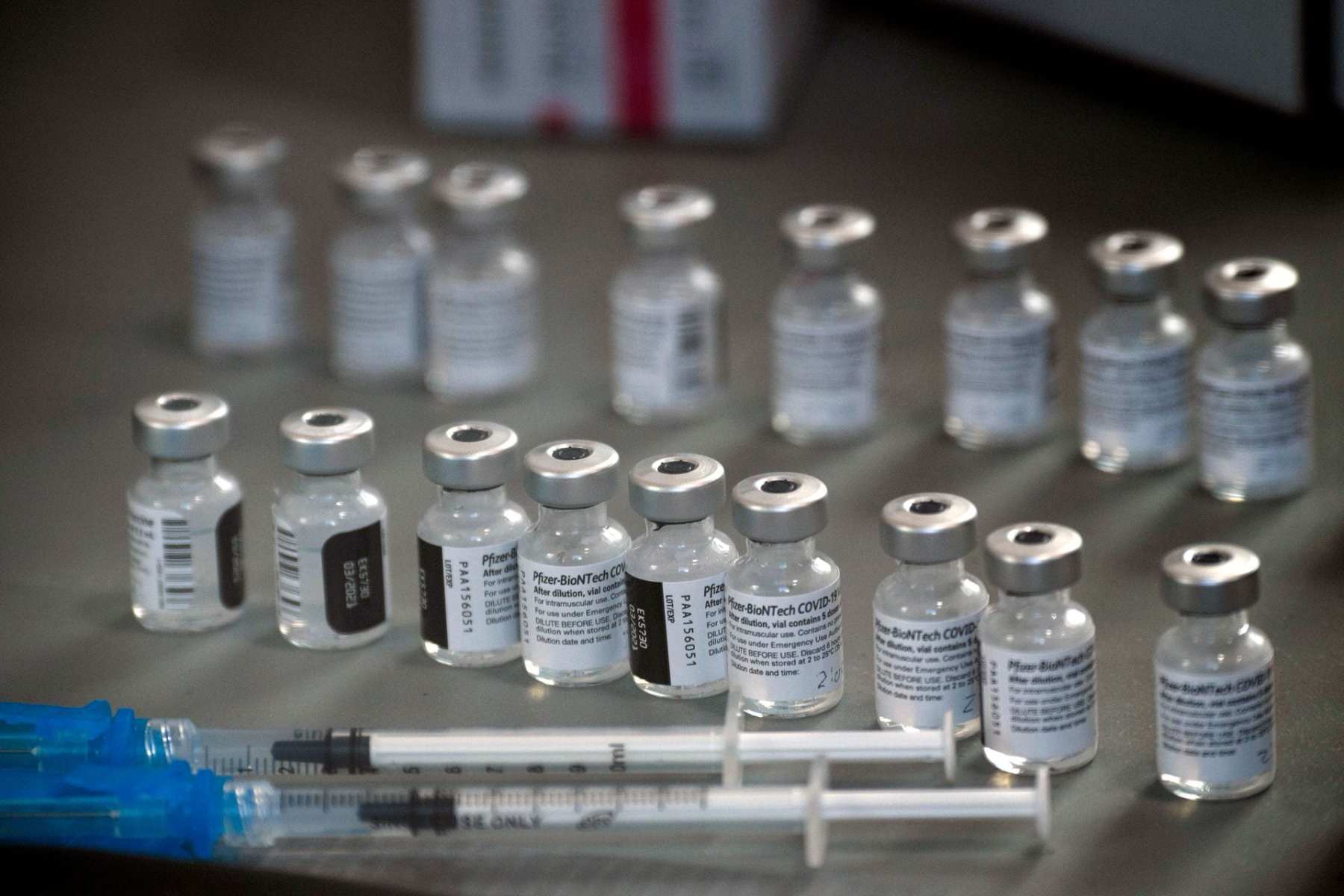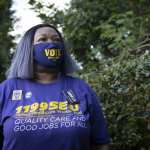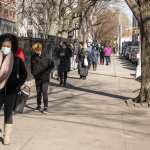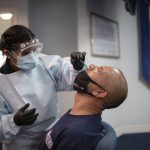Jenny Prado doesn’t know when she’ll be eligible for a coronavirus vaccine, but she’ll get one as soon as she can. Her job in home care means she never left the pandemic frontlines. For her, the vaccine is imperative.
Prado, a 40-year-old undocumented worker in Philadelphia, goes without a critical safety net: Because of her immigration status, she doesn’t qualify for public health insurance programs such as Medicaid, and private coverage isn’t an option.
“We don’t have papers or insurance, and if you do get sick that’s a high cost,” she said through a translator.
Like many home care workers, Prado earns little pay: $12 an hour, eight hours a day, five days a week. That money quickly dwindles as Prado pays for public transportation, protective masks and gloves — all things that are necessary for her to do her job. If she is exposed to COVID-19, Prado knows she is high-risk — a stomach operation years ago left her immunocompromised. She takes extra vitamins daily to guard herself against the virus.
Still, though she’s eager for a vaccine and coronavirus immunity, she’s terrified that getting the injection would pose a different kind of risk.
“With getting a vaccine, my worry is maybe we give information, and they give that information to ICE,” she said. “I know Philadelphia is a sanctuary city. But we don’t know how safe we really are.”
In recent days, the Biden administration has promised to accelerate the nation’s struggling immunization campaign and vowed that equity will be centered in its COVID-19 response. But distribution still falls to the states, many of which are now moving to vaccinate a critical group: frontline essential workers.
Already, experts say, the health system will have to make a concerted effort to reach women on the frontlines. They often have hourly jobs with low wages, and no guarantee of paid leave or child care, which makes it harder for them to access distributed vaccination sites with fixed hours. Job site-based vaccinations — one approach that could address issues with time off and transportation — are virtually impossible for them, given they often work in decentralized industries such as home care or domestic labor.
These issues are especially complicated for immigrant women, who are overrepresented in service fields like home care and domestic work. About 31 percent of foreign-born women work in service jobs, compared to 19 percent of U.S.-born women. Immigrant women are also highly represented in vital frontline roles that power the economy, including meatpacking and food services. They have shouldered a distinctive, heavy burden in the national health crisis, one that could complicate their access to coronavirus vaccines. They face lack of health care access, language barriers and cultural differences, and, for undocumented immigrants especially, fear and distrust of government.
We don’t know how safe we really are
Jenny Prado, home care worker
Immigrants, especially those who are undocumented, are far less likely to have health insurance. And even though Biden has vowed to ensure that all people, regardless of immigration status, can get a vaccine, making sure people trust that promise poses its own challenge.
Public health officials have warned that the Trump administration’s anti-immigrant policies already discouraged people seeking out public resources for getting tested or treated for coronavirus. In particular, they point to the so-called “public charge rule,” which was meant to discourage immigrants from using public benefits by making the use of certain programs count against one’s permanent residency.
Though coronavirus testing, treatment or vaccination don’t count against permanent residency, the distinctions of what programs do count and which don’t are difficult to communicate. The Trump administration, experts note, never worked to clarify that immigrants would not be penalized for seeking coronavirus care. Now, many worry that message could carry over to immigrants weighing a coronavirus vaccine, regardless of their legal status.
“They might be fearful that by somehow putting their name on a list of people getting a vaccine, that might trigger some exposure that would compromise their ability to stay in the U.S.,” said Shelby Gonzales, director of immigration policy at the Center for Budget Policy and Priorities, a liberal think tank in D.C. “They may fear accessing a vaccine that is free … is getting a public benefit that later on will put them in harm’s way when they seek to adjust their status, or seek to bring somebody to the U.S. from outside of the country.”
Undoing the climate of fear will take deliberate outreach from the Biden administration, but there is also a need for concerted on-the-ground organizing and communication, experts said.
“We know there are underlying disparities. Those existing structural inequities, in terms of resources, time and flexibility could then translate into disparities in access to and uptake of the vaccine,” said Samantha Artiga, a vice president at the nonprofit Kaiser Family Foundation who focuses on health disparities. “There are some specific concerns among immigrant families — in particular around fears of sharing information and how information that is shared could be used — that speak to the importance of having targeted outreach and education campaigns.”
Prado’s experience is an example of this. “I would feel safer getting the vaccine if the process had nothing to do with our documents,” Prado said. “A worry I’ve had is people who are undocumented, if we give over that information, it might be compromised.”
There are also language barriers that can make it harder for people to book a vaccine appointment, said Haeyoung Yoon, senior policy director for the National Domestic Workers Alliance. Many of the systems states use to sign people up for vaccination appointments are primarily in English, or connect users to vaccine coordinators who don’t speak their native language, she said.
Because of this, advocates and health disparities researchers worry many women will end up at the back of the line, even while they are working in jobs with higher risk of coronavirus exposure.
For undocumented women in frontline work, it could also be difficult to prove that one is in a priority vaccination group, Yoon said. “For immigrant communities, especially undocumented ones, they work in mainly paperless jobs,” Yoon added. “They may not have the right kind of documentation to prove they’re eligible. That’s going to be a big concern.”
And frontline workers are only one dimension. Immigrant women have also borne the brunt of the pandemic-induced recession: Data from the Migration Policy Institute shows that they are likelier than immigrant men, U.S.-born men or U.S.-born women to have lost work in the past year. Although it’s difficult to tease out the impact on undocumented women specifically, some surveying from the National Domestic Workers Alliance suggests they are more likely than other immigrant women to have lost work in the pandemic. That makes them particularly difficult to reach; public health departments can’t target women through their employment, for instance, if they aren’t able to find work.
Meanwhile, vaccine skepticism and fear — which experts worry is a greater problem amongst women in general — adds another challenge, and will again require deliberate and concerted outreach to combat.
Isabel, a home care worker in Los Angeles County, lives in California through the temporary protected status program, which allows people to live and work in the United States if they are from certain countries affected by natural disasters or military conflict. She is at high risk for the coronavirus: She is in her sixties, has diabetes and hypertension, and is exposed each day to the household of the woman she cares for, increasing the odds she develops coronavirus. (Isabel asked to have her full name withheld.)
But no one has told her when or how she might be eligible for a vaccine, despite her age, pre-existing medical conditions and frontline work. And she has questions about the vaccines — whether, for instance, the Moderna product could trigger an allergic reaction — that no one has helped her answer. She doesn’t know where to go to look for more information or help. (Current data shows that allergic reactions can occur but are exceptionally rare for either the Moderna or Pfizer vaccine.)
“I really need more information about the allergies,” she said through a translator. “I’m just learning that I’m eligible because of my age and the work. All this information is news to me. I don’t have anybody who can walk me through or help me with this process.”
And then there is the difficulty of navigating each individual state’s requirements and processes.
In North Carolina, where, at one point, 50 percent of the state’s cases were among Latinx people, even though they are only 10 percent of the population, the state will be leaving it up to health clinics and individual sites to set up their requirements for vaccination. (State sites, however, will not require identification, a key point of concern for undocumented workers.)
North Carolina is one of the states with the largest number of outbreaks at meat-processing facilities, which across the country are heavily staffed by immigrant frontline workers. They make up about 40 percent of the national food processing workforce.
In Iowa, where outbreaks at Tyson Foods poultry plants have been widespread, Gov. Kim Reynolds said this week the state is working with private companies to ensure meatpacking employees get vaccinated, though it’s unclear how. Nebraska Gov. Pete Ricketts has faced criticism for saying the state is going to prioritize vaccinating citizens and legal residents — undocumented workers at meatpacking facilities will be at the back of the line. Nebraska has had some of the highest number of COVID-19 outbreaks at meat-processing facilities in the country. One study from the Centers for Disease Control and Prevention looking at a single week in April found 588 cases at Nebraska plants — the second highest figure in the nation at the time.
“The way we are prioritizing people is tied to jobs, that is sticky for people who don’t have work authorization,” said attorney Clermont Ripley, the co-director of the Worker’s Rights Project at the North Carolina Justice Center, who has been working with the state to establish a plan to vaccinate undocumented populations. “Undocumented people have a concern about sharing their name with anybody connected to the government. ICE has nothing to do with this, but that fear is still out there.”
North Carolina has not yet finalized its plan, but groups like Ripley’s are trying to ensure dispelling misinformation is central to the next round of the vaccine rollout — and that those messages are communicated in multiple languages and through video. So far, she said, it seems that employers are interested in at least facilitating vaccination.
But still, there is also a fear that the vaccine is not safe — that there is a reason this group is among the first to go.
“There are people who don’t want to get it because they say this is to keep killing people,” said Marisela Martinez, a former employee at a North Carolina meatpacking plant, in Spanish. “I told them, ‘You’re wrong. If that’s true, they would have [already] killed us.’”
Advocates like Ripley said that’s the hardest thing to combat after a year where workers saw their counterparts die and their employers remain silent for weeks about what was really happening inside.
“There is this message that we have to overcome, which is, ‘You’re not going first because you’re expendable and we can experiment on you. You’re going first because you’re essential,’” Ripley said. “But, I mean, we have done nothing else to treat them as essential so why should they believe that message now?”




